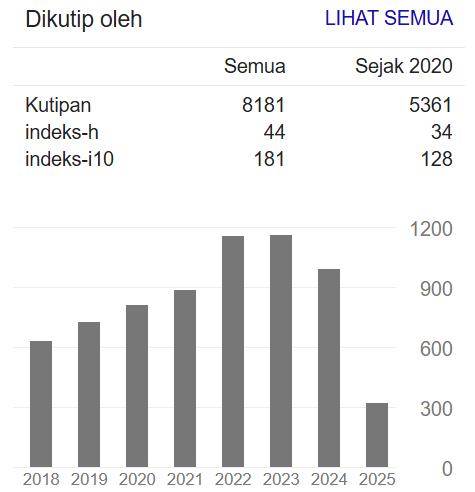EDUKASI LAKTASI BERBASIS ANDROID EFEKTIF MENINGKATKAN PENGETAHUAN IBU HAMIL
DOI:
https://doi.org/10.34011/jmp2k.v35i1.2667Keywords:
android-based application, breastfeeding success, exclusive breastfeeding, Lactation education, pregnant womenAbstract
In 2023, the national coverage of exclusive breastfeeding was just slightly above half. The figure was even lower in West Java. The primary issue is the suboptimal practice of exclusive breastfeeding. This study aimed to analyze the effectiveness of Android-based lactation education in increasing the knowledge of third-trimester pregnant women about exclusive breastfeeding. The study employed a quasi-experimental design with a pre and post-test without a control group approach. The population consisted of third-trimester pregnant women in Bogor City, with a sample of 37 participants selected through a multi-stage random sampling technique. The intervention provided education on exclusive breastfeeding through images and animated videos on an Android application. The analysis employed includes descriptive analysis and the Wilcoxon signed-rank test. The research findings indicate a significant difference (p=0.000) in the knowledge of pregnant women, with the average knowledge increasing from 76.29 before the intervention to 83.81 after the intervention. Respondents found the application to be fairly communicative, with some suggestions for improvement. The Android application has the potential to enhance pregnant women's knowledge about lactation, serving as an innovative strategy to support the success of exclusive breastfeeding.
References
World Health Organization, “Breastfeeding,” 2020. https://www.who.int/health-topics/breastfeeding
American College of Obstetricians and Gynecologists, “Barriers to Breastfeeding: Supporting Initiation and Continuation of Breastfeeding,” Obstet. Gynecol., vol. 137, no. 2, pp. 396–397, Feb. 2021, doi: 10.1097/AOG.0000000000004250.
World Health Organization, “Infant and Young Child Feeding,” 2023.
Badan Kebijakan Pembangunan Kesehatan Kemenkes, “Survei Kesehatan Indonesia (SKI) 2023 Dalam Angka,” Jakarta, 2023.
N. W. Armini and N. G. K. Sriasih, “Pendahuluan,” in Manajemen Laktasi Bagi Tenaga Kesehatan dan Umum, Yogyakarta: Nuha Media, 2020, pp. 1–2.
N. Seyyedi, L. Rahmatnezhad, M. Mesgarzadeh, H. Khalkhali, N. Seyyedi, and B. Rahimi, “Effectiveness of a smartphone-based educational intervention to improve breastfeeding,” Int. Breastfeed. J., vol. 16, no. 1, p. 70, Dec. 2021, doi: 10.1186/s13006-021-00417-w.
C. Dieteren, S. Sarkar, S. Saharan, and I. Bonfrer, “Effects of a smartphone application on maternal health knowledge and dietary diversity among pregnant women in India: a randomized single center pilot study,” J. Glob. Heal. Reports, vol. 6, Nov. 2022, doi: 10.29392/001c.39604.
G. R. Couto, V. Dias, and I. de J. Oliveira, “Benefits of exclusive breastfeeding: An integrative review,” Nurs. Pract. Today, vol. 7, no. 4, pp. 245–254, 2020, doi: 10.18502/npt.v7i4.4034.
J. V. Thomas and E. Riedel, “Barriers to exclusive breastfeeding among mothers during the first four weeks postpartum,” J. Am. Acad. Nurse Pract., vol. 4, no. 5, pp. 1–108, 2016.
S. Mohammed, I. Yakubu, A. G. Fuseini, A. M. Abdulai, and Y. H. Yakubu, “Systematic review and meta-analysis of the prevalence and determinants of exclusive breastfeeding in the first six months of life in Ghana,” BMC Public Health, vol. 23, no. 1, pp. 1–18, 2023, doi: 10.1186/s12889-023-15758-w.
K. Bernstein, P. Gonrong, S. Shallat, B. Seidel, and J. Leider, “Creating a Culture of Breastfeeding Support and Continuity of Care in Central Illinois,” Health Promot. Pract., vol. 23, no. 1_suppl, pp. 108S-117S, 2022, doi: 10.1177/15248399221111180.
M. S. S. de Moura et al., “Use of technologies by nurses to promote breastfeeding: a scoping review,” Rev. Esc. Enferm. USP., vol. 57, p. e20220466, 2024, doi: 10.1590/1980-220X-REEUSP-2022-0466en.
J. S. R. Purba, N. Nopriantini, A. Rafiony, and Y. Petrika, “Pengaruh Penyuluhan Gizi dengan Media Game Edukasi Berbasis Android terhadap Konsumsi Buah dan Sayur,” Media Penelit. Dan Pengemb. Kesehat., vol. 34, no. 3, pp. 620–630, 2024.
R. Pratiwi, D. R. Atmaka, D. A. R. Sutoyo, and T. Mahmudiono, “The Effectiveness of Smartphone-Based Nutrition Education Intervention in Successful Practice of Exclusively Breastfeeding: A Meta-Analysis: Efektifitas Intervensi Edukasi Gizi Berbasis Smartphone dalam Keberhasilan Praktik ASI Eksklusif: Meta Analisis,” Amerta Nutr., vol. 7, no. 4 SE-Literature Review, pp. 615–625, Nov. 2023, doi: 10.20473/amnt.v7i4.2023.615-625.
L. B. Griffin, J. D. López, M. L. Ranney, G. A. Macones, A. G. Cahill, and A. K. Lewkowitz, “Effect of novel breastfeeding smartphone applications on breastfeeding rates,” Breastfeed. Med., vol. 16, no. 8, pp. 614–623, 2021, doi: 10.1089/bfm.2021.0012.
A. Sabo et al., “Knowledge, attitude, and practice of exclusive breastfeeding among mothers of childbearing age,” Front. Public Heal., vol. 11, p. 1277813, Dec. 2023, doi: 10.3389/fpubh.2023.1277813.
N. B. K. Aktürk and M. Kolcu, “The effect of postnatal breastfeeding education given to women on breastfeeding self-efficacy and breastfeeding success,” Rev. Assoc. Med. Bras., vol. 69, no. 8, p. e20230217, 2023, doi: 10.1590/1806-9282.20230217.
R. E. Kapti, Y. S. Arief, and N. Azizah, “Mother’s knowledge as a dominant factor for the success of exclusive breastfeeding in Indonesia,” Healthc. Low-resource Settings, vol. 11, no. s1 SE-Original Articles, Feb. 2023, doi: 10.4081/hls.2023.11209.




